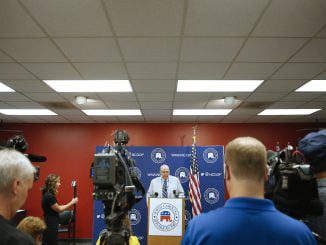
RALEIGH — On Feb. 4, the Democratic majority on the N.C. Supreme Court blocked the legislative and congressional maps drawn by the state General Assembly from being used due to alleged partisan gerrymandering they said would illegitimately give extra power to Republican voters. Now legislative Republicans are attempting to draw new maps by Feb. 18 while considering other options.
New maps will also be accepted from the left-wing voting groups who were plaintiffs in the case. Legal experts suggest the maps from the General Assembly will be given more weight than those from activist groups due to the legislature’s constitutionally delineated responsibility over the process. After the maps from all parties are accepted, a special master, yet to be determined, will judge whether the maps have sufficiently responded to the court’s concerns on fairness and partisan balance.
In the court’s full decision, delivered on Feb. 14, Justice Robin Hudson, who wrote for the majority, said, “Despite the dissenters’ repeated assertions, we seek neither proportional representation for members of any political party, nor to guarantee representation to any particular group. We are only upholding the rights of individual voters as guaranteed by our state constitution.”
In the dissenting opinion — written by Chief Justice Paul Newby and signed onto by the other two Republican justices, Phil Berger Jr. and Tamara Barringer — Newby disagrees, writing that “The majority simply rules that the North Carolina Constitution now has a statewide proportionality requirement for redistricting. In doing so, the conclusion magically transforms the protection of individual rights into the creation of a protected class consisting of members of a political party, thereby subjecting a redistricting plan to strict scrutiny review. The majority presents various general views about what constitutes unconstitutional partisan gerrymandering and provides a variety of observations about what the constitution requires.”
Newby also notes that “Absent from the opinion is what is meant by ‘substantially equal voting power on the basis of partisan affiliation.’”
With the court’s majority saying they do not require proportionality but they do require “substantially equal” partisan power based on voter affiliation statewide, GOP legislators have begun drawing new maps with the help of Democratic leaders at the General Assembly.
The Associated Press reports that House Speaker Tim Moore expects votes in his chamber on maps this week. Moore spokesperson Demi Dowdy also said that House Democrats and Republicans are being given equal access to rooms with map-drawing computers.
A joint statement released last week by Senate Leader Phil Berger, a Republican, and Senate Minority Leader Dan Blue, a Democrat, said, “Over the next few days, Republican and Democratic legislators will work together in hopes of reaching a negotiated end product. Legislators will share that end product with the public and the court as early as practicable. Given the workload and complexity of the mathematical analyses required by the court, this work will likely continue into late next week.”
“The more the new maps appear to be drawn with both R and D input, the more likely they are to be upheld,” Gregory Wallace, a Campbell University Law School professor who teaches on constitutional law, told NSJ on Feb. 14. “Because the Republicans have the majority in the General Assembly, the maps should be expected to reflect that majority. It would be both unreasonable and partisan for the N.C. Supreme Court to expect otherwise.”
Wallace said that this decision from the N.C. Supreme Court was anticipated, given the court’s earlier rulings on partisan gerrymandering and the partisan split on the court. He pointed out, though, that gerrymandering happens all over the country and it has been difficult for courts to arrive at a “judicially-workable standard for judging when there’s too much partisan gerrymandering.”
“That’s why the U.S. Supreme Court ultimately concluded that claims of partisan gerrymandering are nonjusticiable political questions,” he said. “I’m not sure the N.C. Supreme Court has come up with a workable standard.”
In addition to the question of whether the new maps presented by the legislature will be accepted, there is also a potential for an appeal to the U.S. Supreme Court over the original maps being struck down. Because the state Supreme Court is considered the highest authority on the state Constitution, some elements of the case would not be considered by federal courts.
“They would have to appeal on federal constitutional grounds, not state law grounds,” Wallace said. “The argument would be that the N.C. Supreme Court’s decision usurped the power of the state legislature to set the rules for congressional elections in Article I, section 4, of the U.S. Constitution.”
Wallace said appeals based on racial gerrymandering are different, though, because it is illegal under federal law. So the U.S. Supreme Court will hear cases on those grounds, even if state courts are the final word on partisan gerrymandering.
Another consideration is whether Republicans might be able to reverse elements of the decision if they were to flip the state Supreme Court in the 2022 elections. Right now, the court is 4-3 in favor of Democrats, but the only two seats up in 2022 — those of Sam Ervin and Robin Hudson — are currently held by Democrats. If Republicans take even one, they will have the majority.
State Sen. Ralph Hise (R-Mitchell) hinted in a press release after the court’s decision that if the court’s balance shifts, Democrats might not be happy with the increasing politicization of the courts, saying, “I’m certain Democrats will come to regret it.”




